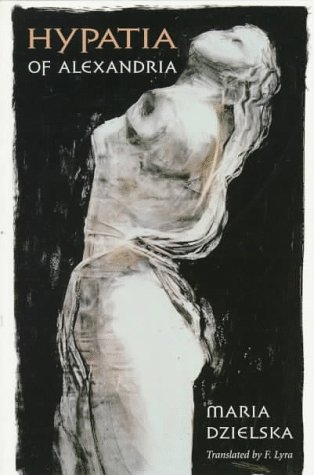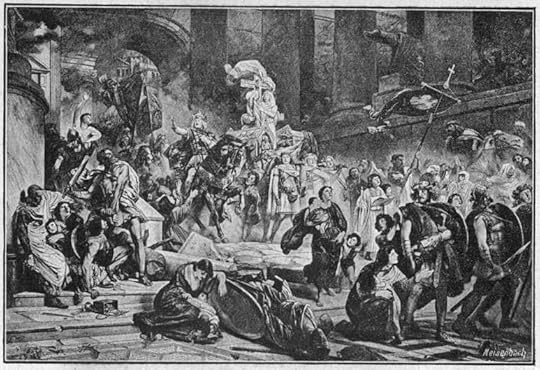Michael Flynn's Blog, page 40
March 29, 2012
Back to the Future!
In 1961...futurists imagined that the milkman would have a robot "dobbin" that would follow him as he made his rounds. Courtesy of Paleofuture.
 What they did not imagine was that kids today would wonder, "What's a milkman?"
What they did not imagine was that kids today would wonder, "What's a milkman?"
Read more at the TOF Spot
 What they did not imagine was that kids today would wonder, "What's a milkman?"
What they did not imagine was that kids today would wonder, "What's a milkman?"Read more at the TOF Spot
Published on March 29, 2012 23:29
Hypatia, again
Agora, the Gift that Keeps on GivingCatching up on tabs.
[image error] A schlock movie A scholarly source,
A scholarly source,
albeit secondaryOver at Armarium Magnum, an atheist blogger yclept Tim O'Neill, who often takes his fellow atheists to task for being, well, stupid and ignorant about history, returns to the movie Agora.
Agora was a movie that purported to tell the life and death of Hypatia of Alexandria, and which hit all the expected tropes. As Marie Dzielka pointed out in her seminal book (entitled, appropriately enough, Hypatia of Alexandria), the poor Neoplatonic philosopher has been roped in as a Symbol for whichever hobby horse the current age was riding. To Gibbon's generation, she symbolized Classicism and the fine old Greco-Roman civilization. To 19th centurians like Draper and White, she symbolized Science (vs. Religion). More recently, she has symbolized Woman (hear her roar). In each mythos, Hypatia was killed because she was a pagan, because she was a "scientist" [sic], or because she was a woman. Better yet, because she was a scientific pagan woman! Read more »
[image error] A schlock movie
 A scholarly source,
A scholarly source,albeit secondaryOver at Armarium Magnum, an atheist blogger yclept Tim O'Neill, who often takes his fellow atheists to task for being, well, stupid and ignorant about history, returns to the movie Agora.
Agora was a movie that purported to tell the life and death of Hypatia of Alexandria, and which hit all the expected tropes. As Marie Dzielka pointed out in her seminal book (entitled, appropriately enough, Hypatia of Alexandria), the poor Neoplatonic philosopher has been roped in as a Symbol for whichever hobby horse the current age was riding. To Gibbon's generation, she symbolized Classicism and the fine old Greco-Roman civilization. To 19th centurians like Draper and White, she symbolized Science (vs. Religion). More recently, she has symbolized Woman (hear her roar). In each mythos, Hypatia was killed because she was a pagan, because she was a "scientist" [sic], or because she was a woman. Better yet, because she was a scientific pagan woman! Read more »
Published on March 29, 2012 16:04
March 28, 2012
m_francis @ 2012-03-27T21:18:00
Universes for Nothing
 Columbia University philosopher David Albert reviewed the latest book by science popularizer Lawrence Krauss in the NYTimes Sunday Book Review, 23 March 2012. He was not kind.
Columbia University philosopher David Albert reviewed the latest book by science popularizer Lawrence Krauss in the NYTimes Sunday Book Review, 23 March 2012. He was not kind.
The book is entitled A Universe from Nothing: Why There Is Something Rather than Nothing, and was described by well-known fellow science-popularizer Richard Dawkins with these words:
 Columbia University philosopher David Albert reviewed the latest book by science popularizer Lawrence Krauss in the NYTimes Sunday Book Review, 23 March 2012. He was not kind.
Columbia University philosopher David Albert reviewed the latest book by science popularizer Lawrence Krauss in the NYTimes Sunday Book Review, 23 March 2012. He was not kind.The book is entitled A Universe from Nothing: Why There Is Something Rather than Nothing, and was described by well-known fellow science-popularizer Richard Dawkins with these words:
“Even the last remaining trump card of the theologian, ‘Why is there something rather than nothing?,’ shrivels up before your eyes as you read these pages. If ‘On the Origin of Species’ was biology’s deadliest blow to supernaturalism, we may come to see ‘A Universe From Nothing’ as the equivalent from cosmology. The title means exactly what it says. And what it says is devastating.”This encomium alone should be sufficient clue that there is less here than meets the eye. Read more »
Published on March 28, 2012 01:18
March 27, 2012
Odds n' Ends
Clearing the TabsA Threat to Learning that We Rarely ConsiderOn a blog entitled "A Corner of Tenth Century Europe" we find the following comment regarding the "active exchange of manuscripts among religious houses in the twelfth century." Peter the Venerable wrote to the Carthusians in 1136/7 asking for a volume of the letters of St Augustine ‘because by accident a bear ate a large part of ours in one of our dependencies.’
-- Peter the Venerable, Ep. 25, ed. Constable, I, 47; see the notes in II, 112And you thought "The dog ate my homework" was a new one.... And what sort of accident could lead to a bear eating a book of Augustine's letters anyway?
The Bear Ate My Test QuestionsRead more »
-- Peter the Venerable, Ep. 25, ed. Constable, I, 47; see the notes in II, 112And you thought "The dog ate my homework" was a new one.... And what sort of accident could lead to a bear eating a book of Augustine's letters anyway?
The Bear Ate My Test QuestionsRead more »
Published on March 27, 2012 20:17
March 25, 2012
Making the World Safe
Sometimes, the Mask Slips, a LittleIn another sweeping triumph for bioethics -- and striking a blow for terrasoteria -- Matt Liao (NYU) and Anders Sandberg and Rebecca Roache (Oxford) have decided that human beings are too contrary to do what they are told; so in order to Save the Planet™ we have to bioengineer humans to be more environmentally friendly. “Human Engineering and Climate Change” to appear in the journal Ethics, Policy and the Environment. Among their progressive innovations:
Read more »
Read more »
Published on March 25, 2012 01:52
March 21, 2012
The War Against the Robots
The Talkies
 Some of you may have seen the recent silent movie The Artist about a silent movie actor who resists the move to the talkies. It's a very good movie,and if you have not seen it, you should. One of the interesting aspects (aside from ironic dialogue bills in which, e.g., the wife tells the actor, "We need to talk" or the actor declares "I will be heard!") is how very different the acting protocols were for silent films. They were, in essence, recorded pantomimes, and whatever the actor had to convey was conveyed through posture and facial expression. Usually, these were exaggerated compared to what we are used to and seem now to be hamming and mugging. (Something similar, though opposite, can be said regarding radio acting protocols, in which everything had to be conveyed by voice or sound effects.)
Some of you may have seen the recent silent movie The Artist about a silent movie actor who resists the move to the talkies. It's a very good movie,and if you have not seen it, you should. One of the interesting aspects (aside from ironic dialogue bills in which, e.g., the wife tells the actor, "We need to talk" or the actor declares "I will be heard!") is how very different the acting protocols were for silent films. They were, in essence, recorded pantomimes, and whatever the actor had to convey was conveyed through posture and facial expression. Usually, these were exaggerated compared to what we are used to and seem now to be hamming and mugging. (Something similar, though opposite, can be said regarding radio acting protocols, in which everything had to be conveyed by voice or sound effects.)
Read more »
 Some of you may have seen the recent silent movie The Artist about a silent movie actor who resists the move to the talkies. It's a very good movie,and if you have not seen it, you should. One of the interesting aspects (aside from ironic dialogue bills in which, e.g., the wife tells the actor, "We need to talk" or the actor declares "I will be heard!") is how very different the acting protocols were for silent films. They were, in essence, recorded pantomimes, and whatever the actor had to convey was conveyed through posture and facial expression. Usually, these were exaggerated compared to what we are used to and seem now to be hamming and mugging. (Something similar, though opposite, can be said regarding radio acting protocols, in which everything had to be conveyed by voice or sound effects.)
Some of you may have seen the recent silent movie The Artist about a silent movie actor who resists the move to the talkies. It's a very good movie,and if you have not seen it, you should. One of the interesting aspects (aside from ironic dialogue bills in which, e.g., the wife tells the actor, "We need to talk" or the actor declares "I will be heard!") is how very different the acting protocols were for silent films. They were, in essence, recorded pantomimes, and whatever the actor had to convey was conveyed through posture and facial expression. Usually, these were exaggerated compared to what we are used to and seem now to be hamming and mugging. (Something similar, though opposite, can be said regarding radio acting protocols, in which everything had to be conveyed by voice or sound effects.) Read more »
Published on March 21, 2012 15:26
March 19, 2012
Slippery Slope? What Slippery Slope?
Slippery Slope? What Slippery Slope?Unthinkable!
 There is a useful distinction between unthinkable and implausible. The latter has to do merely with probabilities (whatever they are). The former has to do with actionability.
There is a useful distinction between unthinkable and implausible. The latter has to do merely with probabilities (whatever they are). The former has to do with actionability.
For a very long time, the idea that Rome might be sacked was unthinkable, and only partly because for much of that time it was also implausible. Sulla or Caesar might cross the Rubicon, or they might compile proscription lists*, but there were some lines they would not cross. Rome herself was sacred. Even while Aurelian was burning Alexandria to reunite the Empire, the idea of burning Rome (by then an Imperial backwater) remained unthought.
Then, one day a Gothic mercenary in arrears on his protection money salary decided to come collect along with a couple thousand of his close personal friends; the sister of two emperors, Galla Placida, "seized control of the Roman Senate and the City and represented the defiance in the last one hundred days of the world"**; and all of a sudden Rome was smoking.
At which point everyone shook themselves and looked at each other and said, "Hey..." What had been unthinkable was now thinkable; and before you knew it, everyone and his great aunt Matilda was sacking Rome, or trying to.
 There is a useful distinction between unthinkable and implausible. The latter has to do merely with probabilities (whatever they are). The former has to do with actionability.
There is a useful distinction between unthinkable and implausible. The latter has to do merely with probabilities (whatever they are). The former has to do with actionability. For a very long time, the idea that Rome might be sacked was unthinkable, and only partly because for much of that time it was also implausible. Sulla or Caesar might cross the Rubicon, or they might compile proscription lists*, but there were some lines they would not cross. Rome herself was sacred. Even while Aurelian was burning Alexandria to reunite the Empire, the idea of burning Rome (by then an Imperial backwater) remained unthought.
Then, one day a Gothic mercenary in arrears on his protection money salary decided to come collect along with a couple thousand of his close personal friends; the sister of two emperors, Galla Placida, "seized control of the Roman Senate and the City and represented the defiance in the last one hundred days of the world"**; and all of a sudden Rome was smoking.
At which point everyone shook themselves and looked at each other and said, "Hey..." What had been unthinkable was now thinkable; and before you knew it, everyone and his great aunt Matilda was sacking Rome, or trying to.
*proscription lists. The rulers would make secret lists of Roman citizens who could be killed without trial. Fortunately, America doesn't have... um, err....Read more »
**Galla Placidia. The quote is from R.A.Lafferty's idiosyncratic Fall of Rome.
Published on March 19, 2012 22:12
March 18, 2012
Political Joke of the Day
A liberal, a moderate, and a conservative walk into a bar. The bartender says, "Hi, Mitt."
Published on March 18, 2012 20:38
Skiffy Update!
The Curmudgeon is BackTOF will be released into the wild Real Soon Now; and except for some residual weariness, is almost feeling like his Old Self. Considering how his Old Self was feeling a week ago, this may not seem much; but...
Status report on skiffiness:
Read more »
Status report on skiffiness:
Read more »
Published on March 18, 2012 19:52
Michael Flynn's Blog
- Michael Flynn's profile
- 237 followers
Michael Flynn isn't a Goodreads Author
(yet),
but they
do have a blog,
so here are some recent posts imported from
their feed.



